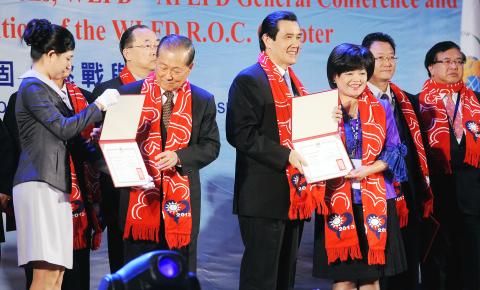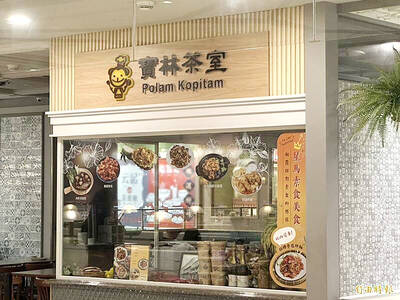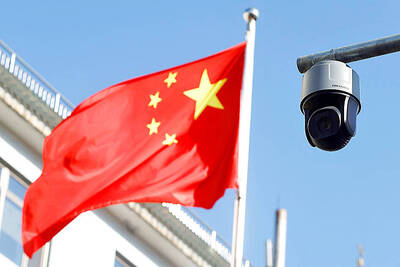President Ma Ying-jeou (馬英九) said on World Freedom Day yesterday that his administration hopes that dialogue between Taiwan and China can extend beyond economic and trade issues, to encompass human rights and the rule of law.
Taiwan’s ultimate goal is to maintain peace in East Asia and allow people on both sides of the Taiwan Strait to pursue the values of freedom and democracy, Ma said at a ceremony in Taipei marking 2013 World Freedom Day.
Ma said that since he took office in 2008, dialogue between Taiwan and China has focused on trade and cultural issues, but he expressed hope that the issues of freedom, democracy, human rights and the rule of law could be taken up in the near future.

Photo: Liu Hsin-de, Taipei Times
“Although democracy is an imported system, we have fully proved over the past 60 years that this foreign system can actually be cultivated in the soil of Chinese culture,” he said, adding that the Republic of China (ROC) has become a fully democratic country.
A sign of that, Ma said, is that Taiwan was again rated a free country in an annual report compiled by Freedom House, a Washington-based human rights advocacy group. Retaining its previous year’s rankings, Taiwan received a rating of “one” for political rights and a “two” for civil liberties, the group said in a press statement last week.
In the rankings, one represents the highest level of freedom and seven the least degree of freedom.
Ma also stressed that as a member of the international community, the ROC is determined to be a peacemaker, a provider of humanitarian aid, a promoter of cultural ties, a creator of new technologies and business opportunities, and a standard-bearer at the leading edge of Chinese culture.
“Without peace, freedom and democracy can hardly be achieved,” Ma said, adding that Taiwan and China have signed 18 agreements over the past five years, an indication of warming ties.
“I am not saying I’m happy with the ‘status quo,’ but at least both sides of the Taiwan Strait have found a peaceful solution to conflicts,” Ma said.
More than 400 guests from about 60 countries and territories attended the World Freedom Day celebrations, as well as the annual general conference of the World League for Freedom and Democracy and the Asian Pacific League for Freedom and Democracy.

POLAM KOPITIAM CASE: Of the two people still in hospital, one has undergone a liver transplant and is improving, while the other is being evaluated for a liver transplant A fourth person has died from bongkrek acid poisoning linked to the Polam Kopitiam (寶林茶室) restaurant in Taipei’s Far Eastern Sogo Xinyi A13 Department Store, the Ministry of Health and Welfare said yesterday, as two other people remain seriously ill in hospital. The first death was reported on March 24. The man had been 39 years old and had eaten at the restaurant on March 22. As more cases of suspected food poisoning involving people who had eaten at the restaurant were reported by hospitals on March 26, the ministry and the Taipei Department of Health launched an investigation. The Food and

The long-awaited Taichung aquarium is expected to open next year after more than a decade of development. The building in Cingshui District (清水) is to feature a large ocean aquarium on the first floor, coral display area on the second floor, a jellyfish tank and Dajia River (大甲溪) basin display on the third, a river estuary display and restaurant on the fourth, and a cafe and garden on the fifth. As it is near Wuci Fishing Port (梧棲漁港), many are expecting the opening of the aquarium to bring more tourism to the harbor. Speaking at the city council on Monday, Taichung City Councilor

A fourth person has died in a food poisoning outbreak linked to the Xinyi (信義) branch of Malaysian restaurant chain Polam Kopitiam (寶林茶室) in Taipei, Deputy Minister of Health and Welfare Victor Wang (王必勝) said on Monday. It was the second fatality in three days, after another was announced on Saturday. The 40-year-old woman experienced multiple organ failure in the early hours on Monday, and the family decided not to undergo emergency resuscitation, Wang said. She initially showed signs of improvement after seeking medical treatment for nausea, vomiting and diarrhea, but her condition worsened due to an infection, he said. Two others who

Taiwanese should be mindful when visiting China, as Beijing in July is likely to tighten the implementation of policies on national security following the introduction of two regulations, a researcher said on Saturday. China on Friday unveiled the regulations governing the law enforcement and judicial activities of national security agencies. They would help crack down on “illegal” and “criminal” activities that Beijing considers to be endangering national security, according to reports by China’s state media. The definition of what constitutes a national security threat in China is vague, Taiwan Thinktank researcher Wu Se-chih (吳瑟致) said. The two procedural regulations are to provide Chinese